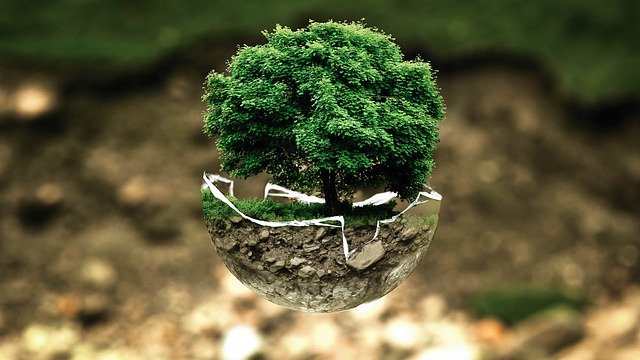
Happy New Year, my friends! As we move into 2022, I’ve been asking myself how I can do my part to make the world better. Instead of trying to overwhelm myself with all of the challenges the world is experiencing, I am focusing on a specific issue, the environment.
Environmental issues have always been one of my top concerns and passions. When I was in college, I worked in the environmental center on campus for a couple of years as a student employee. Why am I passionate about this issue? For me, it’s a no-brainer because I love breathing fresh air and I want my favorite hiking trails and nature spots to be free of development and pollution. I prefer not to have plastic particles and unwanted chemicals in my body. Ultimately, it is for my health.
In the last seven years, I have been making gradual changes in my lifestyle to decrease my carbon footprint. In this blog, I am going to share some of the new information I have learned about being more environmental, the tips and practices that I have been doing continuously. These are the actions that I have comfortably incorporated into my daily routine as habits and a lifestyle. Also, I’ve developed these habits within my means and financial ability. It’s very important for me not to feel overwhelmed and stress myself out by trying to overdo it or trying to do everything. As I am growing, I am still constantly learning more information about the environment.
Plastic
Plastic is one of those things that I hate and can’t live without. I was thankful for plastics during COVID time, and even before COVID time, for keeping things clean and because they are cheap. At the same time, I really abhor the environmental damage that plastics are causing. I have watched videos that show rivers covered with plastic bottles. Here are the actions that I have taken to cut down my plastic usage and waste:
- The very first thing I did almost ten years ago was stop drinking water out of plastic bottles. The only exception is when I travel, especially internationally. Even when I am traveling, if I can’t find a safe place to refill my hydro flask, I buy a gallon or 5 liters of water and refill my canteen with it. This also applies to different events that I have attended. I avoid drinking water out of plastic cups unless there is no other alternative choice.
- If I have to use a plastic bag, I make sure that I use that piece of a plastic bag at least twice or more. For example, I have small trash bins in my place and almost all of my online ordering packages come in plastic bags. So, I reuse these plastics for my trash bins.
- I love Costco. Since I already like to cook, with some preparation and meal planning, I buy bulk food items at Costco that are frozen or nonperishable and buy smaller produce that is available at my local grocer. This helps to cut down on my plastic usage.
- I am pretty proud to say I haven’t ordered any delivery food service. This is not because I don’t support my local restaurants. It’s because the majority of the food is delivered in single-use plastic wraps and containers. The way I support my local restaurants is to walk directly to the restaurant, eat my meal there (preferably outside seating), and avoid having any leftovers to take home in a plastic container.
- Last, I have phased out plastic containers for food. I have a set of reusable glass food containers that I have been using for almost ten years now.
Compost
For the longest time, I thought I was practicing due diligence by reducing my plastic waste. Guess what? Recently, the biggest and most shocking new information I’ve learned is the amount of methane gas released from food waste and scraps. According to the EPA, food scraps and wastes make up more than 30 percent of what we throw away; Americans only compost about 4.1% of these food wastes.[i] When people throw away their food scraps/wastes in plastic trash bags, these trash bags are buried in landfills. The organic materials in the plastic trash bags don’t get oxygen thus they produce a much higher level of methane gas than naturally composted organic materials.
This new information has me thinking a lot about the unnecessary carbon footprint that I have been contributing to unknowingly. I eat a lot of veggies so naturally, I have a lot of organic food scraps. So, as part of my 2022 personal improvement, for a small monthly fee and partnering with my neighbors, I’ve signed up for a compost service in my building, and now I am composting.
You are What You Eat
Lately, I have learned more about biomass use and greenhouse gas emissions from livestock and farming. Out of all of the meat-related products, beef and cheese produce the most greenhouse emissions compared to chicken, some pork, and certain seafood. Some shocking new information that I learned just two weeks ago is that global milled rice production has increased by 230% since 1960. The milled rice production emits “twice as much of the harmful gases as wheat.”[ii] Learning these new pieces of information hurts my soul because I love beef, cheese, and rice.
I am no tree hugger (there is nothing wrong with being a tree hugger) and I am a food lover as much as the next person. And, I am aware that in order to satisfy our high demands for a tasty palate, our pickiness, and to a certain extent our greediness, we as humanity has polluted the earth by having massive feedlots, food processing sites, and gas emissions from transporting food. So, after learning about the greenhouse gas emissions from different foods, I’ve decreased my consumption of high emission food products like beef and cheese, and increased my veggie and chicken intakes. The way I have been balancing this out is by primarily cooking/eating veggies and chicken at home. When I go out to eat, then I treat myself to beef.
My philosophical lifestyle practice is avoiding the “either/or” mentality. I don’t believe in completely cutting one thing off. Knowing myself, the more I tell myself “No” to certain things, the more I want to have them. So, I am all about gradual changes and balance shifting to improve one’s lifestyle.
Food Waste
Each year, about 130 billion meals and more than $408 billion dollars in food is thrown away; that’s about 40% of all food in the US is wasted.[iii] We know that organic food waste in plastic bags in landfills emits high levels of methane gas. Growing up in a Taiwanese/Chinese household, I was taught at a very young age not to waste any food because, for every single grain of rice that’s on my plate or in my bowl, many hard efforts were put into it. So, I rarely throw away food.
Food waste is closely connected to our meal planning, cooking, and eating habits. I notice that, with just five to ten minutes of planning per week, I can completely avoid throwing away or wasting food at home.
I don’t really understand why people dislike leftovers, especially throwing away leftovers from restaurants. I love leftovers because they are there and already made. All I have to do is heat them up in the microwave within minutes.
Recycle
A couple of years ago, I remember learning that the majority of recycled single-use plastics don’t get recycled and end up in landfills. I feel betrayed and disheartened. I also learned that recycling is highly subjective to the local recycling companies’ practices and bottom-line. Depending on where you live (this can vary by state, county, city, and neighborhood), a major city can have up to five or more different recycling companies that have their own standards and processes for what to recycle. This means that a recycling company might take an unwashed glass bottle and another company might just throw it back to the landfill.
So, using my friend’s recommendation, the best way to know what and how to recycle is to call your building/neighborhood/city recycling company and ask them to give you a list of instructions.
A Lingering and Ongoing Reflective Question: Are corporations responsible for cleaning up the waste and pollution they produce?
The reason I am pondering this question is that last month NPR reported that the EPA will begin rolling out billions of dollars to clean up Superfund sites.[iv] After digging into it more, this is what I found from an article in the Washington Post, “‘Over the past 20 years, American taxpayers have spent more than $21 billion in cleanup and oversight costs for properties polluted by dangerous wastes, known as Superfund sites, while hundreds of companies responsible for contaminating water paid little to nothing,’ an analysis of congressional budget data shows.”[v]
Do you think it’s fair for corporations to pollute the land to the point of uninhabitable, pay little or next to nothing to the Superfund, and then have the EPA use taxpayer money to clean the sites up? Please let me know what you think.
My Concluding Thoughts
I know some of you are thinking what’s the point when over 70% of pollution comes from large corporations in the world and my impact is so minimal. I like to say that statistics-wise, it’s true. My response is that the reason we are in this environmental crisis is that too many people have this mentality, thinking that it’s the corporations’ fault and there is nothing they can do. Again, yes, I believe large corporations have a responsibility to do so much better. At the same time, as consumers, we have the responsibility and power to react and act upon it. We can demand changes by switching up our purchasing habits. We can influence change by incorporating healthier daily and lifestyle routines that are better for the environment. We can inspire changes by actually living what we preach and believe.
If you have awesome and practical daily practices to reduce carbon footprint and want to share with others, please let me know. I will post it on my next blog.
Photo by: Bela Geletneky from Pixabay

Recent Comments